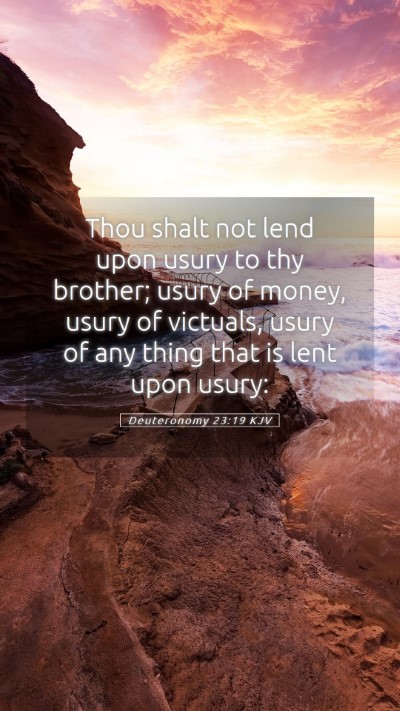Understanding Deuteronomy 23:19
Bible Verse: Deuteronomy 23:19 - “Thou shalt not lend upon usury to thy brother; usury of money, usury of victuals, usury of any thing that is lent upon usury.”
In Deuteronomy 23:19, the Lord provides a specific directive regarding the treatment of one's fellow Israelites, focusing particularly on the concept of usury, or charging interest on loans. This command is part of a larger framework of laws designed to promote justice, mercy, and community among God's people. An examination of this verse reveals significant insights regarding social ethics, economic practices, and the underlying spiritual truths that resonate throughout the Scriptures.
Bible Verse Meanings
The essence of this verse calls for compassion and generosity within the community of faith. Rather than exploiting the financial difficulties of others, the Israelites were encouraged to support one another without the burden of interest, reflecting God's justice and mercy.
Bible Verse Interpretations
Various commentaries provide interpretations that enrich our understanding. For instance, Matthew Henry emphasizes the moral obligation to assist those who are less fortunate without expecting financial gain. His commentary notes the principle of reciprocity and community solidarity that is to govern relationships among believers.
Albert Barnes interprets this verse as a guidance against making profit from a brother's misfortune, suggesting that such practices could lead to deep social rifts and betrayal among the people of God.
Adam Clarke expands on this by pointing out that while usury is forbidden among brethren, it does not mean lending without expectation of return; rather, the emphasis is on interest-free lending in situations of need, promoting a culture of love and goodwill.
Scripture Analysis
- Historical Context: The Israelites lived in a community where social and economic interactions were pivotal to their survival. The prohibition against usury reflects the communal lifestyle they were called to foster.
- Cultural Significance: Lending with interest was a common practice in the ancient Near East. This law set Israel apart as a people who were to reflect God's character through selfless giving and loving service.
Biblical Exegesis
The exegesis of this verse must consider the broader biblical context. It aligns with God's overarching theme of mercy and justice. Additionally, it critiques human tendencies towards greed and exploitation, emphasizing the need for God’s people to act with integrity and kindness.
Bible Study Insights
This verse invites reflection on how contemporary believers can apply its principles in their lives. Modern interpretations might consider how we handle financial transactions with friends and family. Believers are encouraged to evaluate their practices in light of Scripture, asking themselves if they are promoting community welfare or merely engaging in transactions for personal gain.
Bible Verse Commentary
The commentaries suggest that this verse not only carries a command but also a profound insight into the nature of community among believers. It highlights that financial interactions should reflect God's love and kindness.
Application of Deuteronomy 23:19
Understanding this verse involves recognizing its implications today. Believers can learn to approach financial matters with a spirit of generosity rather than a pursuit of profit, creating an atmosphere conducive to mutual support and trust.
Related Bible Cross References
- Exodus 22:25 - “If you lend money to one of my people among you who is needy, do not be like a moneylender; charge him no interest.”
- Leviticus 25:35-37 - Guidance on lending to the poor.
- Psalms 15:5 - “He that putteth not out his money to usury, nor taketh reward against the innocent...”
In summary, Deuteronomy 23:19 serves as a critical instruction for biblical interaction, promoting the principles of fairness and compassion. Its echoes are felt in the broader teachings of Scripture, reinforcing a life that mirrors God's love and justice.


